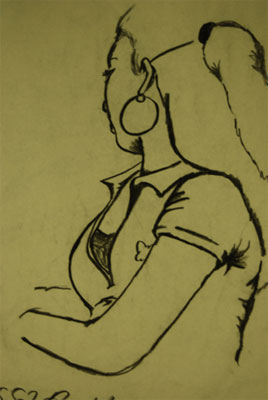All Nonfiction
- Bullying
- Books
- Academic
- Author Interviews
- Celebrity interviews
- College Articles
- College Essays
- Educator of the Year
- Heroes
- Interviews
- Memoir
- Personal Experience
- Sports
- Travel & Culture
All Opinions
- Bullying
- Current Events / Politics
- Discrimination
- Drugs / Alcohol / Smoking
- Entertainment / Celebrities
- Environment
- Love / Relationships
- Movies / Music / TV
- Pop Culture / Trends
- School / College
- Social Issues / Civics
- Spirituality / Religion
- Sports / Hobbies
All Hot Topics
- Bullying
- Community Service
- Environment
- Health
- Letters to the Editor
- Pride & Prejudice
- What Matters
- Back
Summer Guide
- Program Links
- Program Reviews
- Back
College Guide
- College Links
- College Reviews
- College Essays
- College Articles
- Back
The Essay Of A Minute
As I stumble and trip over words, my pen is shaking between my sweaty fingers. Time is ticking and I feel the bomb of the bell about to explode. Letters turning into unrecognizable symbols. My brain searching for more to express, yet my mind is so empty. “Turn in your essays!” He announces. Right as the bell has struck it’s toll.
See what I did there? I was inspired by the story “The Story of an Hour” in which a woman describes her undecided feelings after being told her husband died. This story was viewed in her point of perspective, and is a hot topic on if it is a feminist critic or not. This answer is obvious. Of course it is, to my dismay.
First of all, in the beginning when her husband’s friend broke the news to her, she described it as a “wild abandonment”, as if she couldn’t be independent. This section of the story demonstrates how a woman is weakened when her husband is gone. Even in the end, when the twist is that the main character, Mrs. Mallard, dies but her husband is actually alive, they do not demonstrate the effect her death had on him. Basically stating that if a woman becomes a widow, which by the way sounds dark, evil, and poisonous, she is abandoned. But if a man’s wife dies, it has no effect on him.
Pursuing this further, her cries for her dead husband are compared to as “a child who has cried itself to sleep”.The reason this comparison shows female criticism, is because a child represents innocence and prune to injuries. A child needs constant protection, and the fact that this “child” is crying, means he has lost the sense of safety. She is practically saying that she has lost her sense of security, and is now vulnerable to over powering pain over her loss.
Furthermore, as she is meditating the occurred events, no remorse is shown which then leads to excitement that she is “free, free, free!” Meaning that her marriage was a jail cell in which she was trapped with no escape, and now that her husband is gone she has freedom of abundance. What is disturbingly confusing is that she loved her husband so much, she gave up her free will, yet she is also excited she has it all back. Practically showing that woman can’t have options, or better said, two good things.
Even in the end, when she realizes her true freedom, she so happens to die ‘of a joy that kills’. Yeah I am not swallowing that one! It is as if the mere thought of a woman having true freedom is unthinkable.
Overall, I believe we have enough evidence to confirm that this essay was written with a feminist stereotype. It is a great story, nonetheless, but if the tables were turned the husband would not have shown as much bipolarness as she did.

Similar Articles
JOIN THE DISCUSSION
This article has 0 comments.
